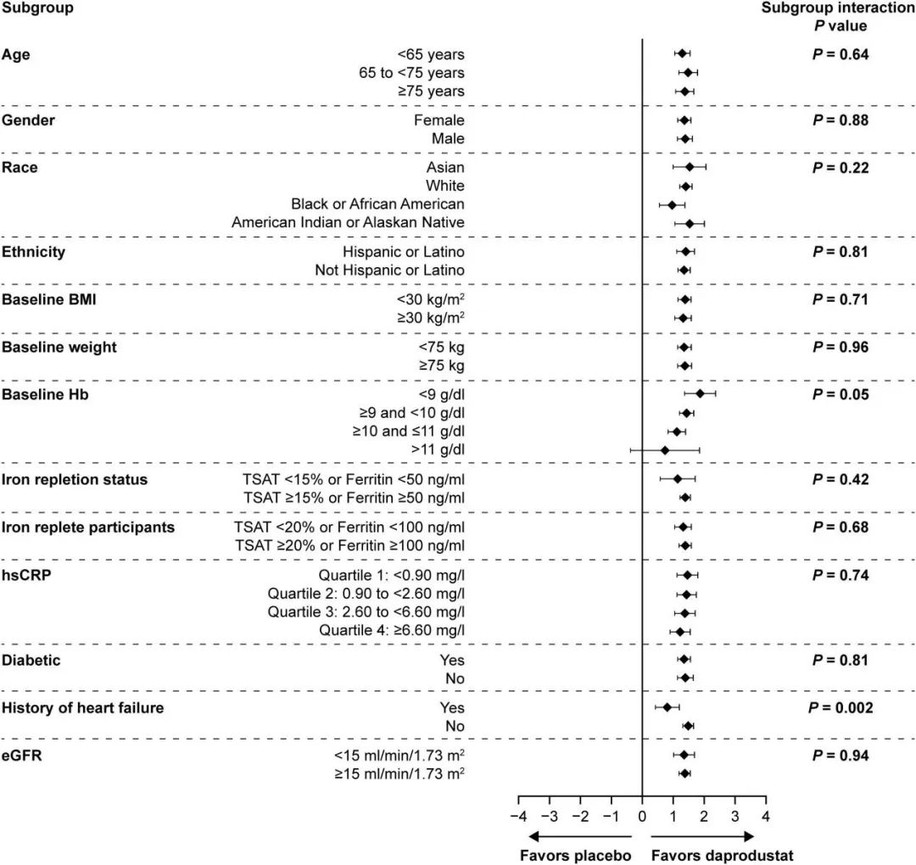
If you have any question, please feel free to email us. We will touch with you as soon as possible.
As renal function declines, patients with chronic kidney disease (CKD) often develop anemia. Anemia patients do not have enough red blood cells or hemoglobin (Hb) in their bodies, so they cannot carry sufficient oxygen throughout the body. Due to insufficient oxygen supply to the body, individuals may experience fatigue, palpitations or increased heart rate, chest pain, shortness of breath, dizziness, headache, and weakness, leading to a decrease in the patient's quality of life. Previous studies have confirmed that hypoxia inducible factor proline hydroxylase inhibitors (HIF-PHI) can improve the quality of life in CKD patients with severe anemia. However, is HIF-PHI also effective for patients with mild to moderate anemia?
On March 1, 2023, Kidney International released the HIF-PHI Daphpristal Quality of Life Measurement Study (ASCEND-NHQ), which showed that Daphpristal monotherapy significantly increased Hb levels in non dialysis CKD patients, improved fatigue symptoms in patients with mild to moderate anemia, and improved their quality of life!
The ASCEND-NHQ study is a multicenter, randomized, double-blind, placebo-controlled clinical study conducted in 142 medical institutions in 14 countries. This study includes a 4-week introduction period, a 28 week treatment period, and a 4-6 week follow-up period. The enrolled patients were divided into a dapulinastatin group and a placebo group in a 1:1 ratio.
The inclusion criteria for the study are: ① CKD stage 3-5 non dialysis patients; ② Anemia, Hb levels ranging from 8.5 to 10.5 g/dL, with transferrin saturation (TSAT) ≥ 15% and ferritin ≥ 50 ng/ml; ③ No red blood cell generation stimulants (ESAs) were used.
During the introduction period, the patient did not receive any ESAs or iron supplements. During the treatment period, the study did not restrict oral iron supplements, and intravenous iron supplements were only for emergency use. Titrate the dose of Dapaglutide to maintain the patient's Hb level between 11-12g/dL.
The main endpoint of the study is the change in patient Hb compared to baseline between weeks 24-28. The secondary endpoint is the proportion of patients with an increase in Hb ≥ 1g/dL, as well as changes in quality of life (assessed by the SF-36 scale). A total of 614 patients were included in the group, with 307 patients in each of the Dapaglutide and placebo groups. Most of the baseline characteristics of the two groups were similar, but there were still some intergroup differences, such as average age (intergroup difference of 1 year), C-reactive protein levels, and the proportion of patients with Hb<9.0g/dL.
In terms of the primary endpoint, compared with the placebo group (0.19g/dL), patients in the dapagliptin group showed a greater increase in Hb levels (1.58g/dL), with an inter group difference of 1.40g/dL (95% CI, 1.23-1.56; P<0.0001) after adjusting for related factors. Furthermore, for all patients, Dapaglutide can improve Hb (Figure 1).

In terms of secondary endpoints, compared to baseline, 77% of patients in the Dapaglutide group had an increase in Hb levels of ≥ 1g/dL, while only 18% of patients in the placebo group had a difference of 56% (95% CI, 49% to 63%; P<0.0001). Compared with the placebo group, patients in the Daprodustat group had a higher quality of life, with a difference of 5.4 points in SF-36 scores between the two groups (95% CI, 2.2-8.6; P<0.0005).
In terms of safety, the Dapaglutide group is similar to the placebo group, with common adverse events including diarrhea, hypertension, and peripheral edema. This study confirms for the first time that for non dialysis CKD patients with baseline Hb ranging from 8.5 to 10.5 g/dL, dapagliptin can significantly improve Hb and quality of life.
For CKD patients with anemia, fatigue and anemia can significantly affect their quality of life, severely affecting their physical and mental well-being. Although current guidelines indicate that improving anemia can improve the quality of life of patients, there is no clear evidence to support the optimal intervention method and intervention population. In early ESAs related studies, ESAs can significantly improve fatigue and quality of life for patients with baseline Hb levels between 6-7g/dL. However, the TREAT study showed that for patients with baseline Hb levels ranging from 10.6 to 12.5g/dL, compared to the placebo group, ESAs (dapoxetine) α) It cannot significantly improve their quality of life. Other non controlled studies, such as observational studies, have also confirmed a certain relationship between improving anemia and improving quality of life, but it is related to baseline Hb levels in patients. In short, the higher the baseline Hb level, the more difficult it is for ESAs or other methods to improve the patient's quality of life. Therefore, understanding the baseline Hb level can clarify the applicable population.
In summary, this study confirms that for patients with Hb levels ranging from 8.5 to 10.5 g/dL, dapagliptin can significantly improve Hb levels and quality of life, benefiting patients.
Tel:+86-020-61855200-673
Fax:+86-020-66392525
Email:info@upharm.cn
Address:12th floor, No. 181, Kexue Avenue, Huangpu District, Guangzhou, China